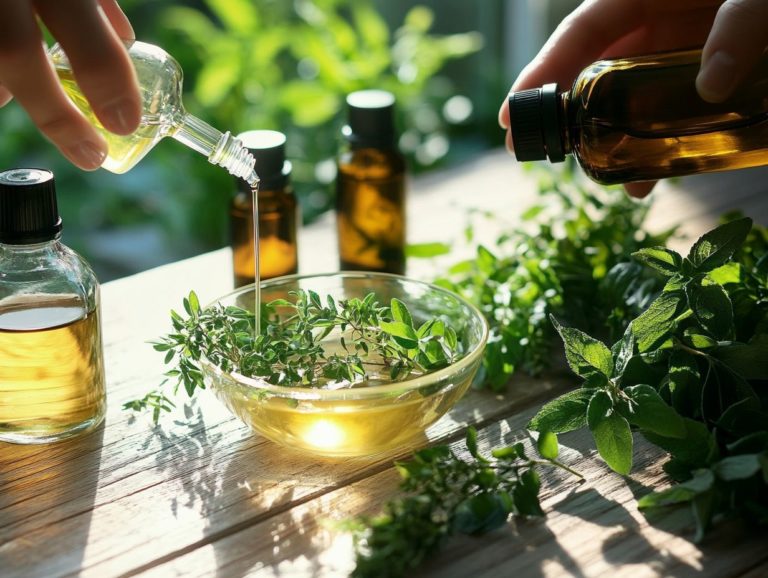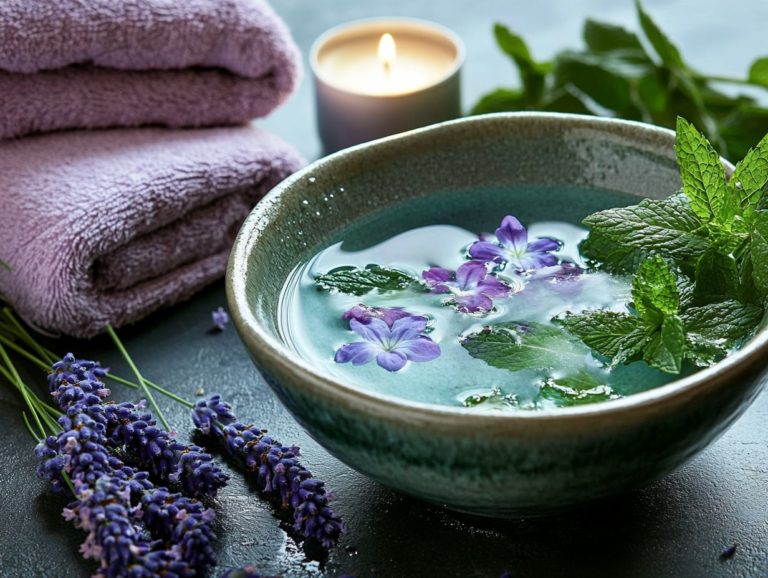Creating Herbal Remedies for Seasonal Changes
Seasonal changes present a captivating blend of beauty and challenges, influencing everything from your mood to your overall health. As the environment transforms, your body often responds in kind. This can lead to common issues like allergies or fatigue.
Fortunately, nature is abundant with herbal remedies that can alleviate these seasonal concerns. This article delves into the factors driving seasonal changes, the advantages of herbal solutions, popular herbs worth considering, and practical tips for seamlessly incorporating these natural remedies into your daily routine.
Discover how you can align with the rhythms of the seasons and enhance your well-being through the remarkable power of herbs.
Contents
- Key Takeaways:
- Understanding Seasonal Changes
- Benefits of Herbal Remedies
- Common Herbs for Seasonal Changes
- Preparing Herbal Remedies
- Using Herbal Remedies Safely
- Incorporating Herbal Remedies into Daily Life
- Frequently Asked Questions
- What are the benefits of creating herbal remedies for seasonal changes?
- What are some common herbs used in herbal remedies for seasonal changes?
- Can herbal remedies for seasonal changes be made at home?
- Are there any potential side effects of using herbal remedies for seasonal changes?
- How often should herbal remedies for seasonal changes be taken?
- Can herbal remedies for seasonal changes be used with other medications?
Key Takeaways:
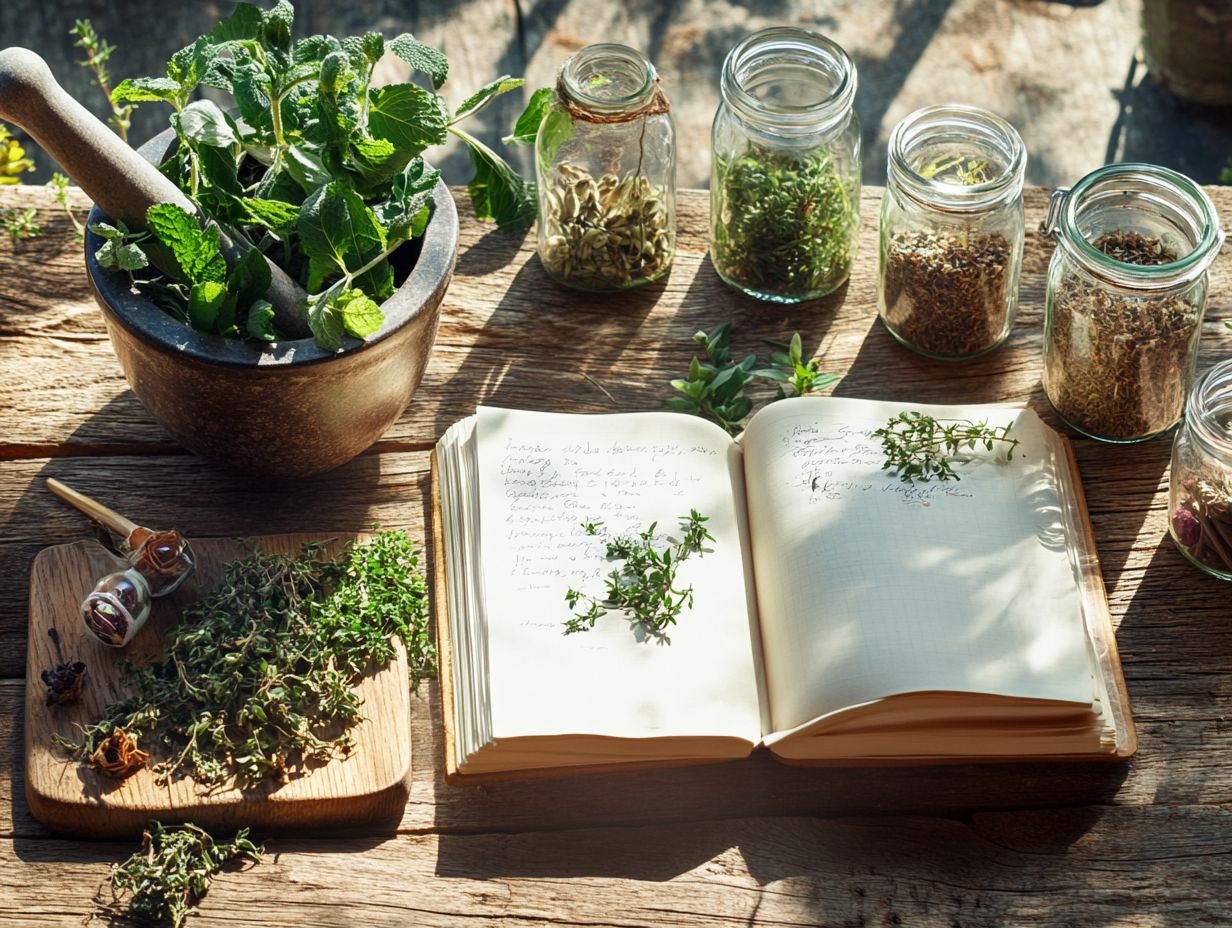
- Natural solutions for seasonal ailments are readily available through herbal remedies.
- Understanding the properties and uses of popular herbs can help in creating effective herbal remedies for seasonal changes.
- Incorporating herbal remedies into your daily routine can provide relief from seasonal changes and promote overall well-being.
Understanding Seasonal Changes
Understanding seasonal changes is essential for maintaining your health and wellness year-round. Your body responds uniquely to different environmental conditions. These seasonal transitions can lead to shifts in your immune system, energy levels, and even emotional well-being. This prompts the need to adapt your dietary choices and wellness practices.
This insight becomes especially valuable when you’re looking to harness natural remedies that can alleviate physical discomfort or offer emotional support as the seasons fluctuate.
What Causes Seasonal Changes?
Seasonal changes are primarily influenced by environmental conditions like variations in temperature, sunlight, and humidity. These can significantly impact your health and overall wellness.
These fluctuations not only shape daily weather patterns but also have a profound effect on the biological processes within living organisms. As daylight hours shift, for instance, hormonal changes occur that can influence your mood and energy levels. This illustrates the intricate connection between environmental cues and physiological responses, highlighting the importance of herbal dosage adjustments for seasonal changes.
Temperature variations can exacerbate certain health conditions, such as asthma or allergies, especially as warmer months bring increased pollen and deteriorating air quality. During these transitions, your stress response may heighten as you navigate new seasonal tasks or grapple with seasonal affective disorders (SAD). Exploring herbal solutions for seasonal affective disorder can be beneficial during this time of year.
This interplay of environmental elements creates a cycle of health implications that requires your awareness and proactive health measures.
Benefits of Herbal Remedies
Herbal remedies can do wonders for your overall wellness, especially when it comes to tackling seasonal ailments and bolstering your immune system.
These remedies deliver essential vitamins and minerals and they also treat various health conditions. As you navigate the market for quality products that prioritize safety, gaining a deeper understanding of the extensive world of herbal medicine can enable you to make informed choices for your health and well-being, including crafting herbal tea blends for every mood.
Natural Solutions for Seasonal Ailments
Natural solutions for seasonal ailments, such as colds and flu, can offer you significant relief while enhancing your immune support during the toughest months.
By incorporating remedies like herbal tea, you can enjoy a soothing yet powerful way to fend off those pesky symptoms. Herbal blends, often infused with ingredients like echinacea root, not only provide warmth but also promote your immune health. If you’re interested in more natural solutions, consider crafting your own herbal remedies at home. Another delightful option is elderberry syrup, celebrated for its antioxidant properties that can play a crucial role in shortening the duration of illnesses.
These remedies can seamlessly fit into your daily routine, delivering essential nutrients and support when your body is under siege from seasonal stressors. For effective relief, consider exploring DIY herbal remedies for common cold relief.
Common Herbs for Seasonal Changes
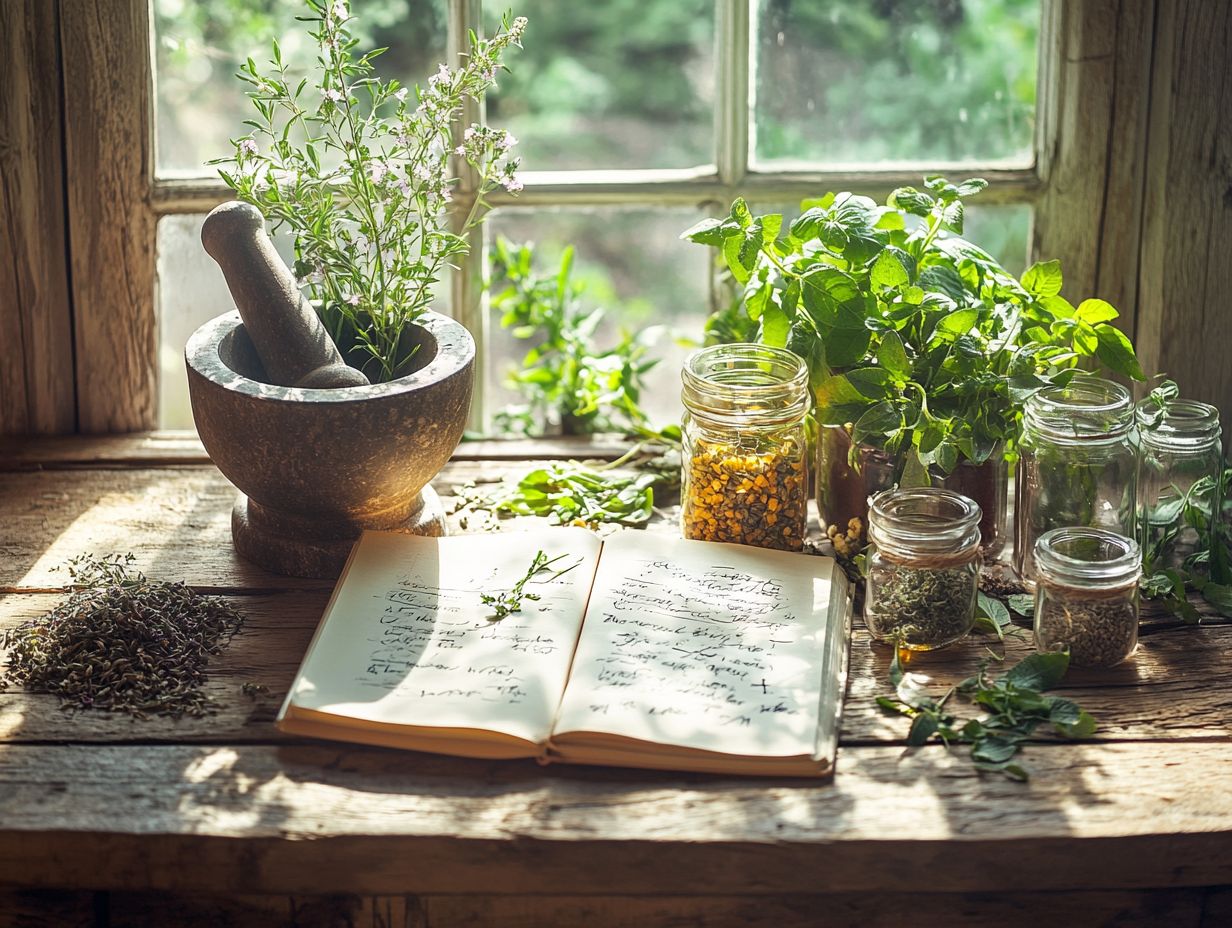
Common herbs you can turn to for navigating seasonal changes offer a range of benefits. They are celebrated for their calming effects and antioxidant properties while aligning with traditional medicine practices.
These herbal remedies help manage stress responses and promote both physical wellness and emotional support during challenging times.
Properties and Uses of Popular Herbs
Popular herbs in herbal medicine, such as echinacea, elderberry, ginger, and hawthorn, are recognized for their unique properties and therapeutic uses. Each of these remarkable herbs offers benefits that cater to various health conditions.
Take echinacea; it’s renowned for its immune-boosting attributes, making it a go-to for fending off colds and flu. Elderberry is celebrated for its ability to fight viruses, providing reliable support during seasonal illness outbreaks. Then there’s ginger, known for its anti-inflammatory effects, often used to soothe digestive discomfort and ease nausea. Lastly, hawthorn stands out for its heart health benefits and its ability to strengthen cardiovascular function. Additionally, exploring how herbs can help with seasonal flu can provide further insights into natural remedies.
Together, these herbs exemplify the healing potential found in nature, playing a vital role in promoting your overall wellness.
Preparing Herbal Remedies
Preparing herbal remedies opens up a world of possibilities! You can explore various methods like crafting herbal tinctures and extracts. Each approach offers a distinct way to tap into the remarkable benefits of these potent plants.
Follow simple recipes to create effective remedies that meet your health needs and tackle seasonal challenges! This enables you to nurture your well-being naturally.
How to Make Herbal Remedies
You have several methods to create herbal remedies, including brewing herbal tea, preparing soothing blends, and formulating strong herbal extracts or dietary supplements.
Among these techniques, the art of brewing herbal tea shines as a straightforward yet effective way to tap into the healing properties of medicinal herbs. For instance, to prepare a calming chamomile tea, steep dried chamomile flowers in boiling water for about five minutes, then strain and serve. If you like, add a touch of honey for sweetness. Additionally, you can explore using herbal solutions for cold and flu symptoms to enhance your wellness routine.
Crafting a relaxing tea blend can also be delightful! Consider combining lavender, lemon balm, and passionflower, all known for their soothing benefits. On the other hand, herbal tinctures require a bit more finesse, typically involving alcohol or glycerin to extract the beneficial compounds from herbs over several weeks. For those seeking relief from allergies, check out 5 DIY herbal remedies for seasonal allergies for some effective options.
By following these crafted recipes and instructions, you can elevate your wellness routine and explore natural herbal remedies for allergies that offer various natural benefits.
Using Herbal Remedies Safely
Utilizing herbal remedies safely is essential for maximizing their effectiveness and minimizing safety concerns. By following established guidelines and understanding the properties of herbal medicine, you can enhance your wellness practices while steering clear of potential adverse effects.
Guidelines and Precautions for Safe Usage

When exploring herbal remedies, it’s crucial to consider safety concerns, including the right dosage and possible interactions with other medications.
A safe approach to herbal practice requires understanding the specific needs of each remedy. Begin with lower dosages to assess your reactions, as sensitivity can differ significantly from person to person. For more guidance, refer to our safety tips for creating herbal remedies.
Timing also plays a vital role; some herbs are best taken with meals, while others may need to be consumed on an empty stomach for optimal effectiveness. Consulting with a healthcare provider can help you navigate potential risks associated with interactions, particularly if you re on prescribed medications.
By staying informed and cautious, you can create a safe and effective herbal experience.
Start your journey to wellness today by trying these herbal remedies!
Incorporating Herbal Remedies into Daily Life
Integrating herbal remedies into your daily routine can elevate your wellness and boost your health through mindful dietary choices. This practice allows you to take charge of your health effectively.
By encouraging the regular use of powerful remedies, you can adapt to seasonal changes and enhance your overall well-being.
Tips for Making Herbal Remedies a Part of Your Routine
Building habits around herbal remedies can improve your emotional health and physical wellness. Start by setting aside a specific time each day for preparation and consumption.
Consider beginning your morning with a soothing cup of herbal tea or unwinding with a calming tincture in the evening. Mindfulness plays a key role here.
Savor each sip or dose to deepen your connection with the healing properties of the herbs. Maintaining a journal to track your responses can increase your awareness and reinforce positive habits.
Practices like meditation or yoga can elevate your wellness. These simple acts can transform into beneficial routines that nourish both body and soul.
Frequently Asked Questions
What are the benefits of creating herbal remedies for seasonal changes?
Making herbal remedies for seasonal changes offers a natural way to maintain your health. These remedies can strengthen your immune system and ease symptoms of seasonal allergies.
What are some common herbs used in herbal remedies for seasonal changes?
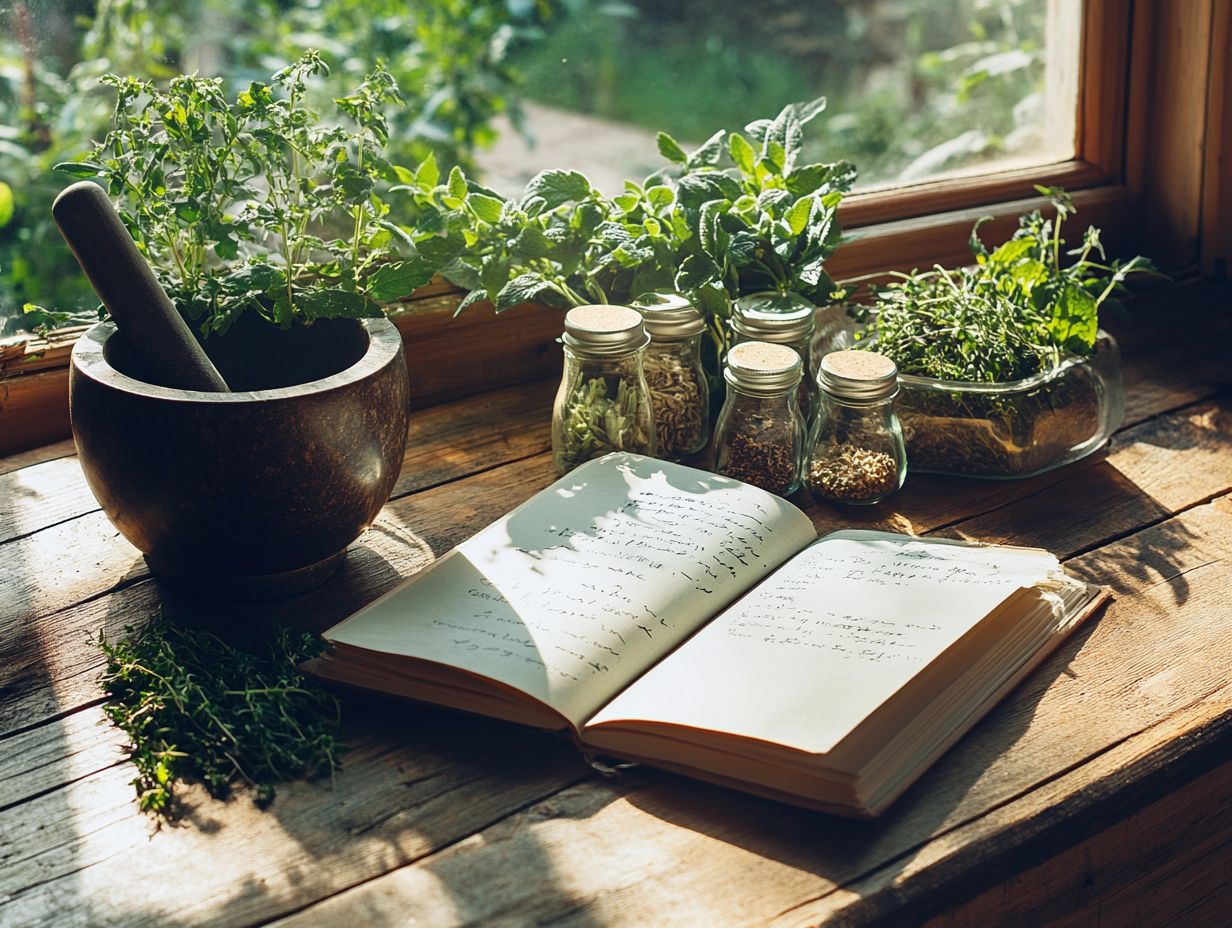
Common herbs include echinacea, ginger, elderberry syrup, and peppermint. These herbs have natural medicinal properties that can alleviate seasonal symptoms while providing additional health benefits.
Can herbal remedies for seasonal changes be made at home?
Yes! You can easily make herbal remedies at home using quality ingredients like herbal extracts and dietary supplements. This not only saves you money but also gives you control over what goes into your remedies.
Are there any potential side effects of using herbal remedies for seasonal changes?
While generally safe, herbal remedies can interact with certain medications or have negative effects on individuals with specific medical conditions. Always check for safety and consult a healthcare practitioner before use.
How often should herbal remedies for seasonal changes be taken?
The frequency of taking herbal remedies varies by remedy and personal needs. Some can be taken daily, while others might be needed only when symptoms arise. Always follow the recommended dosage or consult a healthcare professional.
Can herbal remedies for seasonal changes be used with other medications?
Yes, but consulting a healthcare practitioner first is crucial. Some herbs, like butterbur and stinging nettle, may interact with medications, so it’s essential to check for potential issues.

